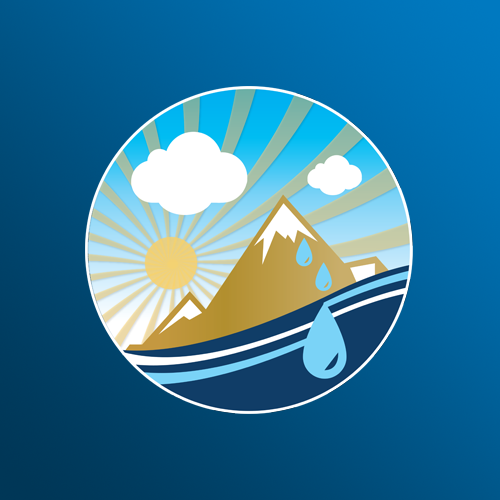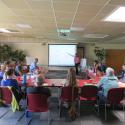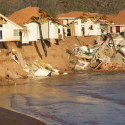Lisa Dilling
-
 Professor, Environmental StudiesEnvironmental Defense FundFellow of CIRES
Professor, Environmental StudiesEnvironmental Defense FundFellow of CIRESLisa Dilling
Lisa Dilling is a Professor of Environmental Studies and a Fellow of the Cooperative Institute for Research in Environmental Sciences (CIRES) at the University of Colorado, Boulder. She is a PI and was Director of WWA for 7 years from 2014-2021. Her current research focus is on decarbonization of the energy system, climate resilience, and understanding how science can best support robust decision making in deeply uncertain contexts. Her past research has focused on climate adaptation and adaptive capacity, drought and urban water management, climate change and public lands, and municipal policies regarding natural hazards.
Projects
-

-

-

-

-

-

-

-

-

-

-

-

-

Climate and Flooding Project: Supporting Flood Planning in the Mountain West Region in the Context of Climate Change Impact, Future Growth and Migration
Flooding is the second deadliest weather-related hazard in the US and one of the most pressing issues for small and mid-sized cities in the Mountain West region.
Publications
-
Clifford, K. R., J. Henderson, Z. McAlear, L. Dilling, B. Duncan, S. Ehert, S. Arens, R. Page, and U. Rick. 2023. “The ‘Nuts and Bolts’ of Doing Coproduction: Exploring Implementation Decisions in Climate Adaptation Research with Stakeholders.” Bulletin of the American Meteorological Society 104 (4): E872–83. https://doi.org/10.1175/BAMS-D-21-0292.1
-
Dilling, Lisa, Meaghan E. Daly, William R. Travis, Andrea J. Ray, and Olga V. Wilhelmi. 2023. “The Role of Adaptive Capacity in Incremental and Transformative Adaptation in Three Large U.S. Urban Water Systems.” Global Environmental Change 79 (March): 102649. https://doi.org/10.1016/j.gloenvcha.2023.102649
-
Dilling, Lisa, Maria Carmen Lemos, and Nuvodita Singh. 2021. “Commentary: First, Do No Harm: Scaling Usable Knowledge for Just and Equitable Outcomes.” Global Environmental Change 71 (November): 102404. https://doi.org/10.1016/j.gloenvcha.2021.102404
-
Henderson, Jen, Lisa Dilling, Rebecca Morss, Olga Wilhelmi, and Ursula Rick. 2021. “‘We Got in the Pilot Program to Learn from It:’ Features of Social Learning in Drought Contexts Along the Arkansas River in Colorado.” Weather, Climate, and Society, June. https://doi.org/10.1175/WCAS-D-20-0120.1
-
Page, R. and L. Dilling (2020). How experiences of climate extremes motivate adaptation among water managers. Climatic Change. doi: 10.1007/s10584-020-02712-7
-
Dilling, L., A. Prakash, Z. Zommers, F. Ahmad, N. Singh, S. de Wit, J. Nalau, M. Daly, and K. Bowman (2019). Is Adaptation Success a Flawed Concept? Nature Climate Change, 9 (8): 572–74. doi: 10.1038/s41558-019-0539-0
-
Page, R. and L. Dilling (2019). The Critical Role of Communities of Practice and Peer Learning in Scaling Hydroclimatic Information Adoption. Weather, Climate, and Society, 11, 851-862, September 24. doi: 10.1175/WCAS-D-18-0130.1
-
Smith, R., J. Kasprzyk, and L. Dilling (2019). Testing the potential of Multiobjective Evolutionary Algorithms (MOEAs) with Colorado water managers. Environmental Modelling & Software, Vol. 117, 149-163. doi: 10.1016/j.envsoft.2019.03.011
-
Dilling, L., R. Morss, and O. Wilhelmi (2018). Learning to Expect Surprise: Hurricanes Harvey, Irma, Maria, and Beyond. Journal of Extreme Events, Vol. 4, No. 3. doi: 10.1142/S2345737617710014
-
Averyt, K., J.D. Derner, L. Dilling, R. Guerrero, L. Joyce, S. McNeeley, E. McNie, J. Morisette, D. Ojima, R. O'Malley, D. Peck, A.J. Ray, M. Reeves, and W. Travis (2018). Regional Climate Response Collaboratives: Multi-Institutional Support for Climate Resilience. Bulletin of the American Meteorological Society, 891-898. doi.org/10.1175/BAMS-D-17-0183.1
-
Dilling, L., K. Clifford, E. McNie, J. Lukas, and U. Rick (2018). Making Research More Usable at CU Boulder. Western Water Assessment Report, February, 26 pp. Making Research More Usable at CU Boulder.pdf
-
Dilling, L., M.E. Daly, D.A. Kenney, R. Klein, K. Miller, A.J. Ray, W.R. Travis, and O. Wilhelmi (2018). Drought in urban water systems: Learning lessons for climate adaptive capacity. Climate Risk Management. doi: 10.1016/j.crm.2018.11.001
-
Dilling, L., E. Pizzi, J. Berggren, A. Ravikumar, and K. Andersson (2017). Drivers of adaptation: Responses to weather- and climate-related hazards in 60 local governments in the Intermountain Western U.S., Environment and Planning A, 1-21, http://sciencepolicy.colorado.edu/admin/publication_files/2017.02.pdf
-
Smith, R., J. Kasprzyk, and L. Dilling (2017). Participatory Framework for Assessment and Improvement of Tools (ParFAIT): Increasing the impact and relevance of water management decision support research.Environmental Modelling & Software, 95, 432-446, doi: 10.1016/j.envsoft.2017.05.004
-
Simpson, C., L. Dilling, K. Dow, K. Lackstrom, M.C. Lemos, and R. Riley (2016). Assessing needs and decision contexts: RISA approaches to engagement research, in: Climate in Context: Science and Society Partnering for Adaptation, Ed. A. Parris and G. Garfin3-26, Wiley and Sons. ISBN: 9781118474792 http://sciencepolicy.colorado.edu/admin/publication_files/2016.19.pdf
-
Gordon, E., L. Dilling, E. McNie, and A. Ray (2016). Navigating scales of knowledge and decision-making in the Intermountain West: Implications for science policy. Climate in Context: Science and Society Partnering for Adaptation, Ed. A. Parris and G. Garfin, 235-254, Wiley and Sons. http://sciencepolicy.colorado.edu/admin/publication_files/2016.20.pdf
-
Kirchhoff, C. and L. Dilling (2016). The role of U.S. states in facilitating effective water governance under stress and change. Water Resources Research, Volume 52, Issue 4, Pages 2951-2964 doi: 10.1002/2015WR018431
-
Dilling, L., K. C. Kelsey, D. P. Fernandez, Y. D. Huang, J. B. Milford, and J. C. Neff (2016). Managing Carbon on Federal Public Lands: Opportunities and Challenges in Southwestern Colorado. Environmental Management, Volume 58, Pages 283-296 doi: 10.1007/s00267-016-0714-2
-
Dilling, L., K. Lackstrom, B. Haywood, K. Dow, M. C. Lemos, J. Berggren, and S. Kalafatis (2015). What stakeholder needs tell us about enabling adaptive capacity: The intersection of context and information provision across regions in the United States. Weather, Climate, and Society, 7:(1) 5-17 doi.org/10.1175/WCAS-D-14-00001.1
-
Dilling, L., M. E. Daly, W. R. Travis, O. V. Wilhelmi, and R. A. Klein (2015). The dynamics of vulnerability: Why adapting to climate variability will not always prepare us for climate change. WIREs Climate Change, Volume 6, Issue 4, Pages 413-425 doi: 10.1002/wcc.341
-
Dilling, L. (2015). Community involvement critical to adaptation, managing climate change risks. Daily Camera, May 3 Daily Camera
-
Dilling, L. (2015). Adaptation. Research Handbook on Climate Governance, Ed. K. Bäckstrand and E. Lövbrand, 470-479, Edward Elgar Publishing. doi: 10.4337/9781783470600
-
Dilling, L., and J. Berggren (2014). What do stakeholders need to manage for climate change and vulnerability? A document-based analysis from the Intermountain West region of the U.S. Regional Environmental Change, 15 (4): 657–67 doi: 10.1007/s10113-014-0668-y
-
Archie, K. M., L. Dilling, J. B. Milford, and F. C. Pampel (2014). Unpacking the “information barrier”: Comparing perspectives on information as a barrier to climate change adaptation in the interior mountain West. Journal of Environmental Management, 133:397-410 doi.org/10.1016/j.jenvman.2013.12.015
-
Liverman, D., S. C. Moser, P. S. Weiland, L. Dilling, M. T. Boykoff, H. E. Brown, E. S. Gordon, C. Greene, E. Holthaus, D. A. Niemeier, S. Pincetl, W. J. Steenburgh, and V. C. Tidwell (2013). Climate Choices for a Sustainable Southwest. In Assessment of Climate Change in the Southwest United States: A Report Prepared for the National Climate Assessment, edited by G. Garfin, A. Jardine, R. Merideth, M. Black, and S. LeRoy, 405–435. A report by the Southwest Climate Alliance. Washington, DC: Island Press. https://swcarr.arizona.edu/sites/default/files/ACCSWUS_Ch18.pdf
-
Dilling, L. and R. Romsdahl (2013). Promoting Adaptation Success in Natural Resource Management Through Decision Support: Lessons from the Great Plains and Rocky Mountain Regions. In: S. Moser and M. Boykoff (eds.), Successful Adaptation to Climate Change, Routledge, pp. 180-185. https://www.routledge.com/Successful-Adaptation-to-Climate-Change-Linking-Science-and-Policy-in-a/Moser-Boykoff/p/book/9780415525008
-
Archie, K. M., L. Dilling, J. B. Milford and F. C. Pampel (2012). Climate Change and Western Public Lands: A Survey of U.S. Federal Land Managers on the Status of Adaptation Efforts. Ecology and Society, 17(4). http://sciencepolicy.colorado.edu/admin/publication_files/2012.29.pdf
-
Gordon, E. and L. Dilling (2010). An Empirical Approach to Defining Success in Adaptation. Paper presented at Initiative on Climate Adaptation Research and Understanding Through the Social Sciences (ICARUS) Workshop on Climate Vulnerability and Adaptation: Theory and Cases, Champaign, IL.